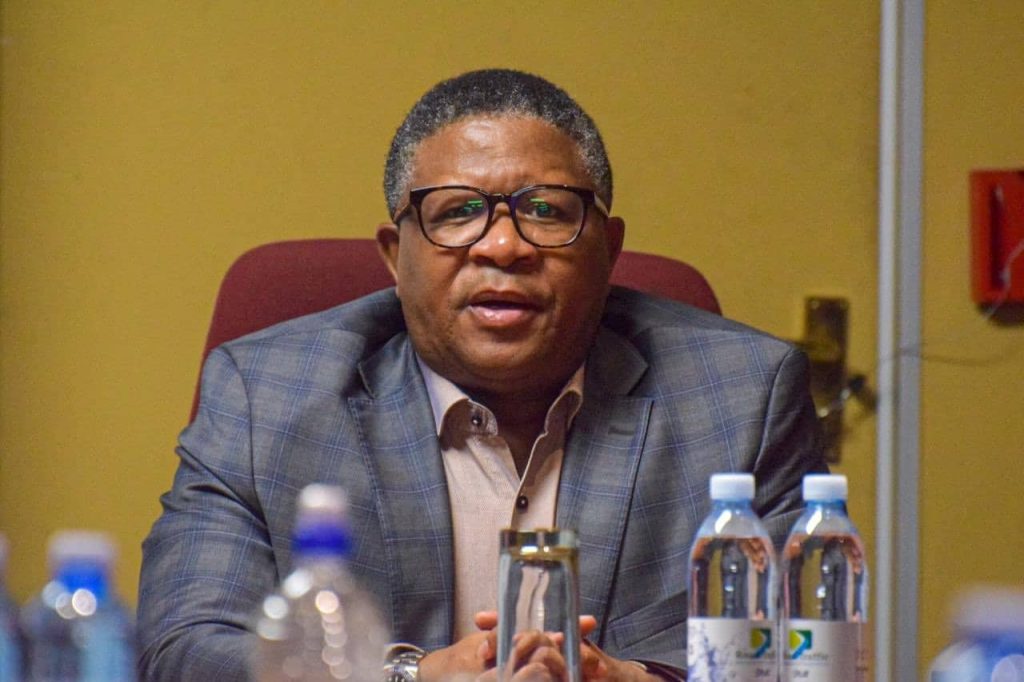ANC secretary-general Fikile Mbalula has shut down any talk of President Cyril Ramaphosa stepping down after calls for his axing by some within the party.
Speaking at a media briefing at the Electoral Commission of South Africa’s (IEC) results operating centre on Sunday, Mbalula said the party was open to talks with other political parties to form a new government.
He said party officials had mandated him to head a team for “talks about talks” with parties willing to enter into negotiations with the ANC.
After 30 years of uninterrupted ANC rule, the ruling party attained only 40% of the vote in Wednesday’s elections, largely due to the MK Party of its former president Jacob Zuma, which surged to a shock victory in KwaZulu-Natal, receiving nearly 15% of the national vote.
Zuma’s party has been clear it would not go into any coalition with an ANC led by Ramaphosa.
Some ANC national executive committee (NEC) members have been lobbying for support to have Ramaphosa removed to ensure the party goes into a coalition with the MK Party and the EFF.
“Ramaphosa is the president of the ANC. If you come to us with a demand that Ramaphosa must stand down as president, that is not going to happen … No political party will dictate terms like that to the ANC. That is a no-go area,” Mbalula said, adding that Ramaphosa was part of a leadership collective which, when tested, would not run.
The officials will meet on Monday and then hold a meeting with the national working committee (NWC) on Monday before the party holds its much anticipated NEC meeting where it is expected that the party will finalise its strategy going into negotiations.
Ramaphosa will participate in the IEC’s formal ceremony to officially announce the results. This means parties will have 14 days to negotiate a coalition to form a government in terms of the constitution.
The Sunday Times reported that the ANC was exploring four options, one of which is the formation of a government of national unity. Other options include the so-called grand coalition with the DA, a minority government or a call for a re-run of the elections.
The NEC is divided on which path it should take in forming coalitions.
At least three groups have formed within the ANC’s NEC. Those aligned with Ramaphosa are lobbying for the NEC to approve a coalition with the DA. Insiders say that this group wants to negotiate for the DA to take over the legislature while the ANC retains control of government.
The second grouping, aligned to ANC chairperson Gwede Mantashe is calling for the ANC to form a coalition with leftist parties including the EFF and the MK party. There is also a view by some in this faction that the party must work with the IFP and the EFF. This group includes the Gauteng leaders who are already in coalitions with the EFF in the Ekurhuleni and Johannesburg metros.
A small group of NEC members will lobby for the party to relegate itself to the opposition benches.
Mbalula said the ANC will be guided by ideology and principle in their negotiations, adding that the party would define models of working within a coalition.
“We want to achieve stability, constitutionality, the rule of law. All of those things must then begin to guide us but equally how do you satisfy the interest of the ANC constituency that voted.
“Those six million people and more, how are they going to be served by the working relations of these parties … We can assure you we are applying our mind,” he said.
Despite calls for the party to disband its KwaZulu-Natal structures after its dismal showing in the elections, Mbalula said this will not happen.
Mbalula said that blame for the poor showing must be shared equally by the NEC collective.
He said the party was caught off-guard by Zuma’s electoral support in KwaZulu-Natal.
“We knew Zuma would get support but not this much … Our biggest worry based on the last election and as we do work in KZN was the IFP and the posture the royal house had taken. By so saying, it was moving away from us and getting into politics by supporting the IFP in these elections. We are not in the blame game, we are stating the facts,” he said.
Mbalula conceded that the ANC had committed mistakes in governance which had led to its poor election showing.
In Gauteng, the party lost the middle-class vote while its base in townships like Soweto failed to turn out. He said communities of Soweto protested against the ANC in the election having been affected by years of electricity and water shedding.
TimesLIVE
